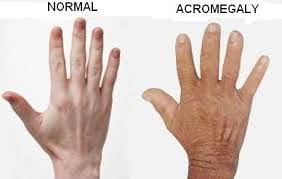 Acromegaly is the Greek word for “extremities” and “enlargement.” When the pituitary gland produces excess growth hormone, this results in excessive growth – called acromegaly. The excessive growth occurs first in the hands and feet, as soft tissue begins to swell. This rare disease affects mostly middle-aged adults. Untreated, the disease can lead to severe illness and death.
Acromegaly is the Greek word for “extremities” and “enlargement.” When the pituitary gland produces excess growth hormone, this results in excessive growth – called acromegaly. The excessive growth occurs first in the hands and feet, as soft tissue begins to swell. This rare disease affects mostly middle-aged adults. Untreated, the disease can lead to severe illness and death.
What causes acromegaly?
Overproduction of growth hormone (GH) by the pituitary gland over a long period of time causes acromegaly. There are several reasons for overproduction of GH. The most common reason is the presence of a pituitary adenoma, which is a benign (non-cancerous) tumor of the pituitary gland. These tumors produce excess GH.
According to the National Institute of Diabetes and Digestive and Kidney Diseases (NIDDK), more than 95% of people with acromegaly have a pituitary adenoma.
Tumors outside the pituitary gland can also cause acromegaly, but this is rare. Learn more about pituitary tumors.
What are the symptoms of acromegaly?
Symptoms of acromegaly vary depending on how long the patient has had the disease. The following are the most common symptoms of acromegaly. However, each individual may experience symptoms differently. Symptoms may include:
- swelling of the hands and feet
- facial features become coarse as bones grow
- body hair becomes coarse as the skin thickens and/or darkens
- increased perspiration accompanied with body odor
- protruding jaw
- voice deepening
- enlarged lip, nose, and tongue
- thickened ribs (creating a barrel chest)
- joint pain
- degenerative arthritis
- enlarged heart
- enlargement of other organs
- strange sensations and weakness in arms and legs (carpal tunnel syndrome)
- snoring
- fatigue and weakness
- headaches
- loss of vision
- irregular menstrual cycles in women
- breast milk production in women
- impotence in men
- diabetes
- high blood pressure
The goal of treatment is to restore the pituitary gland to normal function, producing normal levels of growth hormone.
Treatment may include removal of the tumor, radiation therapy, and injection of growth hormone blocking drugs.
Left untreated, acromegaly can lead to worsening diabetes mellitus and hypertension. The disease also increases a patient’s risk for cardiovascular disease and colon polyps that may lead to cancer.
Complications
Progression of acromegaly can result in major health problems. Complications may include:
- High blood pressure (hypertension)
- Cardiovascular disease, particularly enlargement of the heart (cardiomyopathy)
- Osteoarthritis
- Diabetes mellitus
- Goiter
- Precancerous growths (polyps) on the lining of your colon
- Sleep apnea, a condition in which breathing repeatedly stops and starts during sleep
- Carpal tunnel syndrome
- Spinal cord compression
- Vision loss
Early treatment of acromegaly can prevent these complications from developing or becoming worse. Untreated, acromegaly and its complications can lead to premature death.
Treatment
Treatment focuses on lowering your production of GH, as well as reducing the negative effects of the tumor on the pituitary gland and surrounding tissues. You may need more than one type of treatment.
- Surgery
Endoscopic transnasal transsphenoidal surgery
Doctors can remove most pituitary tumors using a method called transsphenoidal surgery. In this procedure, your surgeon works through your nose to extract the pituitary tumor.
Removing the tumor can normalize GH production and eliminate the pressure on the tissues surrounding your pituitary gland to relieve associated signs and symptoms. In some cases, your surgeon may not be able to remove the entire tumor. This may result in persistently elevated GH levels after surgery, requiring further medical or radiation treatments.
- Medications
Drugs used to lower the production or block the action of GH include:
- Drugs that reduce excess growth hormone secretion (somatostatin analogues).The drugs octreotide (Sandostatin) and lanreotide (Somatuline Depot) are synthetic versions of the brain hormone somatostatin. They can interfere with the excessive secretion of GH by the pituitary gland, causing rapid declines in GH levels. These drugs are given by injection into the muscles of your buttocks (gluteal muscles) once a month by a health care professional.
- Drugs to lower hormone levels (dopamine agonists).The oral medications cabergoline and bromocriptine (Parlodel) lower levels of GH and IGF-I in some people. The tumor may decrease in size in some people taking a dopamine agonist. Some people may develop compulsive behaviors, such as gambling, while taking these medications.
- Drug to block the action of GH (growth hormone antagonist).The medication pegvisomant (Somavert) blocks the effect of GH on body tissues. Pegvisomant may be particularly helpful for people who haven’t had good success with other forms of treatment. Given as a daily injection, this medication can normalize IGF-I levels and relieve symptoms in most people with acromegaly, but it doesn’t lower GH levels or reduce the tumor size.
- Radiosurgery
Your doctor may recommend radiation treatment when tumor cells remain after surgery. Radiation therapy destroys any lingering tumor cells and slowly reduces GH levels. It may take years for this treatment to noticeably improve acromegaly symptoms.
